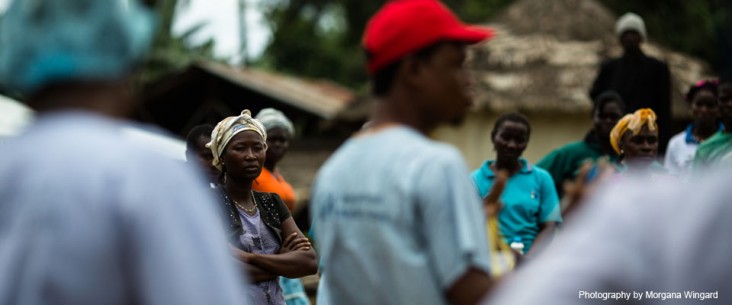
USAID supports programs that strengthen countries' ability to provide critical services to promote government accountability, attract private sector investment in local economies, empower civil society and media, ensure safe learning environments, strengthen social protection systems, facilitate election processes, increase access to clean water and sanitation and reduce Ebola survivor stigmatization.
Background
The Ebola outbreak devastated lives and livelihoods in some of the most vulnerable countries in the world, infecting over 28,600 people in Guinea, Sierra Leone and Liberia, and killing over 11,300.
In response, USAID led a U.S. Government effort to contain the disease and bring the number of cases to zero. Despite this success, Ebola- related fears and restrictions continue to have direct, negative impacts in all three countries. These include a retraction in previous development gains, severely disrupted economic and social activity, and a decline in the delivery of essential government services.
USAID, in partnership with the host governments, international donors, and implementing partners, is executing a robust set of long-term development programs to address these second-order impacts and ensure that Guinea, Sierra Leone, Liberia and other countries in the region are prepared to effectively prevent, detect, and respond to future outbreaks.
What We're Doing
To address these second-order impacts of the Ebola outbreak, USAID is supporting activities to strengthen host governments’ ability to deliver critically needed services. We have targeted several areas for assistance, including improving governance and democratic processes, providing water and sanitation access for Ebola-affected communities, ensuring school safety, and implementing social protection for vulnerable communities.
USAID is also encouraging private sector investment in local economies. The private sector’s contribution to the Ebola response has been unprecedented in many ways. Companies and organizations working in West Africa mobilized to help the broader national, regional and global response and helped stem the tide of the epidemic. Now well into the recovery phase, private-sector partnerships are helping build resilience and jumpstart a resurgence of economic growth in the region. These partnerships are crucial to increasing the impact and sustainability of USAID’s work.
We have supported the following specific activities in the three countries:
In Guinea, we launched Consortium for Elections and Political Process Strengthening (CEPPS) activity with the purpose of reinforcing the capacity of Guinea’s Independent National Electoral Commission (CENI). The activity also targets empowering civil society organizations and strengthening their capacity to conduct domestic election observation and monitoring. USAID is also supporting the development of a new health governance program in the country that will strengthen the Ministry of Health and improve legislative oversight. In addition, we have partnered with Rio Tinto to strengthen health systems.
USAID is similarly supporting the development of a new health governance program in Sierra Leone. In addition, the Women Empowered for Leadership and Development (WELD) initiative is helping to enhance women's leadership by building the capacity of local councils and sub-national entities to plan, manage, and deliver gender-sensitive programs and policies. USAID is also supporting private sector engagement in the country through Project Last Mile with Coca-Cola that involves advising the Ministry of Health on supply chain management to improve delivery of health supplies to health care facilities.
In Liberia, we have strengthened public service accountability and civil society in Liberia through our support of the Civil Society and Media Ebola Accountability program. This initiative has taken steps to increase unity among community leaders and has galvanized citizens to prevent misuse of Ebola funds at the local level. USAID is also supporting the design of a new three-year e-governance program that will employ use of shared information and communications technology services across government ministries and agencies to provide ICT support for open government.
In partnership with UNICEF, USAID helped ensure that Liberian children returned to school safely following a more than six-month hiatus due to the Ebola outbreak, and ensure that schools continue to provide safe and supportive learning environments for students across the country. We are also partnering with UNICEF to build a water and sanitation infrastructure in 120 schools in Liberia. In collaboration with the World Bank, USAID is developing an integrated social protection system and database to provide needed assistance to vulnerable populations in Liberia. It will include a social registry and accompanying management information system, and will lower the transaction costs associated with cash transfer components of social protection. We are also partnering with Coca-Cola to strengthen health care supply chain management, with Cell Com to expand Internet access, and with Cross Boundary to increase solar energy adoption.
Results
- In Guinea, USAID supported a free and fair presidential election in 2015 in which a network of about 70 public and private radio and television stations educated an estimated 3 million people of voting age on the election process.
- In Liberia, USAID is providing over 7,000 infection prevention and control (IPC) kits to more than 4,400 schools across the country, and has trained teachers and administrators how to prevent Ebola infection. USAID and UNICEF are also distributing learning kits to over 700,000 students and 44,000 teachers. The learning kits contain supplies teachers and children require during the school year.
- In partnership with the Liberia Municipal Water and Sewer Corporation, USAID has begun rehabilitation of the piped water system in Voinjama District, one of the cities mostly heavily affected by the Ebola outbreak. In addition to providing a city-wide source of clean drinking water to at least 90% of Voinjama’s 15,000 residents, the new year-round source of water will facilitate improved infection control to limit future outbreaks.







Comment
Make a general inquiry or suggest an improvement.